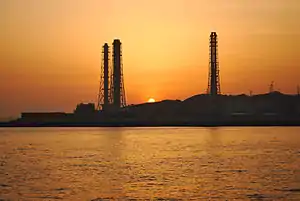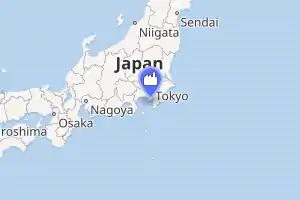Yokosuka Thermal Power Station
Yokosuka Thermal Power Station (横須賀火力発電所, Yokosuka Karyoku Hatsudensho) is a large thermal power station operated by Tokyo Electric in Yokosuka, Kanagawa, Japan. The facility is located in Kurihama, at the southern tip of Miura Peninsula.[1][2]
| Yokosuka Thermal Power Station | |
|---|---|
 | |

| |
| Country | Japan |
| Location | Yokosuka, Kanagawa |
| Coordinates | 35°12′56″N 139°42′59″E |
| Status | Operational |
| Commission date | 1960 |
| Decommission date | 2010 (restored 2011) |
| Owner(s) | Tepco |
| Thermal power station | |
| Primary fuel | Fuel oil |
| Power generation | |
| Nameplate capacity | 874 MW |
| External links | |
| Commons | Related media on Commons |
History
Plans to build a power station in Yokosuka were drawn up in 1957, and a site was prepared next to Kurihama Port by filling in part of the bay. The 1st unit with a 265 MW General Electric turbine, went on line in October 1960. A total of 8 units were constructed by 1970, giving the plant a total power generating capacity of 2630 MW, which served to power the cities of Kanagawa Prefecture and Tokyo Metropolis.
An additional gas turbine Unit 1 burning light oil was opened on an experimental basis in July 1971, followed by Gas Turbine Unit 2 (burning natural gas) in July 1993. However, plans were made to close the facility by the mid-2000s due to rising fuel and maintenance costs. Unit 1 was closed in December 2004, followed by Unit 2 and Units 5-8 in March 2006. All remaining units were closed by April 2010.
In order to meet the expected shortage of electrical energy from the aftermath of the 2011 Tōhoku earthquake and tsunami and Fukushima Daiichi nuclear disaster, Tokyo Electric began reactivating mothballed portions of the plant, bringing Gas Turbine Unit 2 back on line on April 28, 2011, Gas Turbine Unit 1 on June 2, 2011. Unit 3 was restored on June 19 and Unit 4 on July 6. Total generating capacity is now at 874 MW.
Tokyo Electric is planning to replace all existing equipment at the Yokosuka Thermal Power Plant with 13 new gas turbine units with a total rated capacity of 3296 MW within 2011.[3]
Generating Units
Unit 1 (scrapped)
- Rated capacity: 265 MW (GE)
- Operational: October 1960 – December 2004
Unit 2 (scrapped)
- Rated capacity: 265 MW (Toshiba)
- Operational: September 1962 – March 2006
Unit 3 (operational)
- Rated capacity: 350 MW (GE)
- Operational: May 1964 – April 2010; resumed from June 19, 2011
- Fuel: heavy oil, crude oil
Unit 4 (operational)
- Rated capacity: 350 MW (Toshiba)
- Operational: July 1964 – March 2006; resumed from July 6, 2011
- Fuel: Heavy Oil, Crude Oil
Unit 5 (mothballed)
- Rated capacity: 350 MW (Toshiba)
- Operational: July 1966 – April 2010
- Fuel: Heavy Oil, Crude Oil
Unit 6 (mothballed)
- Rated capacity: 350 MW (Toshiba)
- Operational: January 1967 – April 2010
- Fuel: Heavy Oil, Crude Oil
Unit 7 (mothballed)
- Rated capacity: 350 MW (Toshiba)
- Operational: September 1969 – April 2010
- Fuel: Heavy Oil, Crude Oil
Unit 8 (mothballed)
- Rated capacity: 350 MW (Toshiba)
- Operational: January 1970 – April 2010
- Fuel: Heavy Oil, Crude Oil
Gas Turbine Unit 1 (operational)
- Rated capacity: 30 MW (Toshiba)
- Operational: July 1971 – April 2010; resumed from June 2, 2011
- Fuel: Diesel
Gas Turbine Unit 2 (operational)
- Rated capacity: 144 MW (Toshiba)
- Operational: July 1993 – April 2010; resumed from April 28, 2011
- Fuel: light oil, natural gas
References
- Power stations in Japan
- Thermal power stations in Japan Archived March 19, 2011, at the Wayback Machine
- Tokyo Electric home page